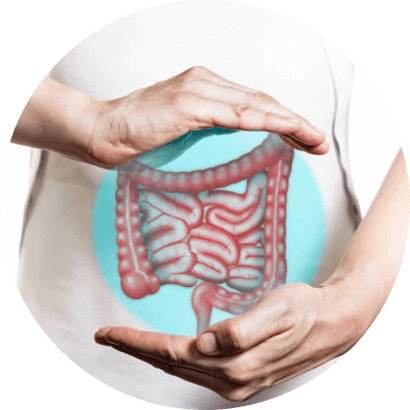
Dr. Mouhsen Al Hosein is an expert in the latest techniques for haemorrhoid treatment. His minimally invasive and technologically advanced procedures result in minimal pain, quicker recovery, and better patient outcomes compared to traditional approaches. Dr. Al Hosein offers advanced haemorrhoid treatments, including:
THD—Assisted Doppler Procedure—This procedure is minimally invasive, does not require tissue excision, and treats excess blood flow and prolapse.
Laser Treatment – Minimally invasive treatment, 15-minute procedure, minimal pain.
The Rafaelo® Procedure – 15-minute procedure. Minimal pain with same-day discharge.
What Are Hemorrhoids?
Normally, there are veins located at the junction of the rectum and the anus. Along with the sphincter, these veins and their surrounding tissue ensure the complete closure of the anus and prevent leakage. Haemorrhoids, also known as piles, are a very common condition that occurs when these veins become swollen, similar to varicose veins. This can happen as a result of bowel movements or increased abdominal pressure, such as during pregnancy. Everyone has these veins, but problems arise when they become enlarged.
Haemorrhoids may be located inside the rectum (internal haemorrhoids) or under the skin around the anus (external haemorrhoids).
Hemorrhoid Types
- Grade I: Slightly enlarged hemorrhoidal tissue.
- Grade II: Enlarged hemorrhoidal veins that protrude when pressing but retract by themselves.
- Grade III: Much larger hemorrhoidal veins that require manual repositioning into the anal canal.
- Grade IV: Extensive hemorrhoidal veins and tissue with permanent protrusion.
Common Causes of Hemorrhoids
The stretching in the lower rectum due to increased abdominal pressure is the leading cause of haemorrhoids. Other risk factors include:
- Straining during bowel movements or passing hard stool
- Pregnancy
- Weakening of tissue with age
- Chronic diarrhoea or constipation
- Obesity
- An unhealthy lifestyle (lack of exercise, poor eating habits, alcohol)
- Low-fibre diet
Hemorrhoid Symptoms
Haemorrhoids can be painless and often go unnoticed. However, in some cases, the following symptoms may occur:
- Bleeding during bowel movements, usually bright red blood on toilet paper.
- They are swelling protruding from the anus. Haemorrhoids may feel like small lumps and project from the back passage only after straining; in severe cases, they may be constantly visible.
- Pain and discomfort in the anal area.
- Skin irritation and intense itching.
Hemorrhoid symptoms depend on the location of the affected veins in the anal canal:
- Internal haemorrhoids: Located inside the anus and usually invisible. They can get irritated after passing stool, causing damage to the veins’ surface.
- External haemorrhoids: Located just under the skin around the anus. They easily become irritated, causing pain or bleeding.
- Thrombosed haemorrhoids: A clot (thrombus) forms in an external haemorrhoid. This can cause severe pain, swelling, and the sensation of a hard lump in the anus, often requiring a minor surgical procedure.
What Should I Do If I Suffer from Haemorrhoids?
Since haemorrhoids are common and can cause significant discomfort, seeking medical advice is essential. Dr. Mouhsen Al Hosein can help you by diagnosing your condition and explaining the available treatment options.
Hemorrhoid Treatment
Haemorrhoid treatment depends on the severity of symptoms and the size of the haemorrhoids. Grade I haemorrhoids may improve with non-invasive treatments such as creams and dietary changes. However, Grades II-IV often require a surgical procedure. Advances in haemorrhoid treatments over the past decade mean that faster and more effective relief is now available.
Dr. Mouhsen Al Hosein provides the latest technology to offer alternative, patient-friendly surgical treatments for haemorrhoids, including Ultrasound-Assisted Procedures. This advanced technique preserves anorectal anatomy without removing haemorrhoids.
During the procedure, Dr. Al Hosein ligates the vessels that bring arterial blood to the haemorrhoids, reducing excessive blood flow. This occurs in an area that is less sensitive to pain and is followed by the repositioning of prolapsed haemorrhoids to their original site.
For more information or to schedule a consultation with Dr. Mouhsen Al Hosein, contact today.
FAQs
What are haemorrhoids?
Haemorrhoids are swollen veins located in the rectum and anus due to increased pressure or strain.
How do haemorrhoids start, and are they common?
Haemorrhoids develop due to straining during bowel movements, pregnancy, or increased abdominal pressure and are very common.
What are the symptoms of haemorrhoids?
Symptoms include bleeding, swelling, pain, discomfort, itching, and lumps in the anus.
Can haemorrhoids burst or bleed?
Yes, haemorrhoids can bleed, especially during bowel movements, and may burst in some cases.
Can haemorrhoids turn into cancer?
Haemorrhoids do not turn into cancer, but medical consultation is advised to rule out other conditions.
When do haemorrhoids require medical attention?
If haemorrhoids cause persistent pain, bleeding, or swelling, medical attention is necessary.
How are haemorrhoids treated?
Treatments range from dietary changes and creams to advanced minimally invasive procedures.
What is hemorrhoid banding?
Hemorrhoid banding is a non-surgical procedure where a band is placed around the haemorrhoid to cut off its blood supply, causing it to shrink.
BOOK APPOINTMENT


